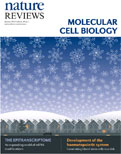|
| TABLE OF CONTENTS | |||||||||||||||||||||||||||||||||||||
| January 2017 Volume 18 Number 1 | Advertisement | ||||||||||||||||||||||||||||||||||||
2015 2-year Impact Factor 38.602 Journal Metrics 2-year Median 30 | In this issue
|
| |||||||||||||||||||||||||||||||||||
| |||||||||||||||||||||||||||||||||||||
 | |||||||||||||||||||||||||||||||||||||
| |||||||||||||||||||||||||||||||||||||
| REVIEWS | Top | ||||||||||||||||||||||||||||||||||||
| Reverse-topology membrane scission by the ESCRT proteins Johannes Schöneberg, Il-Hyung Lee, Janet H. Iwasa & James H. Hurley p5 | doi:10.1038/nrm.2016.121 New observations of ESCRT-mediated reverse-topology membrane scission are building towards a structural and biophysical explanation of the mechanism involved. Abstract | Full Text | PDF | Supplementary information | |||||||||||||||||||||||||||||||||||||
Alternative polyadenylation of mRNA precursors Bin Tian & James L. Manley p18 | doi:10.1038/nrm.2016.116 Alternative polyadenylation (APA) generates mRNAs with varying 3' termini. It is regulated by variation in the concentration of cleavage and polyadenylation factors and by RNA-binding proteins, as well as by splicing and transcription. APA is important for cell proliferation and differentiation owing to its roles in mRNA metabolism and protein diversification. Abstract | Full Text | PDF | Supplementary information | |||||||||||||||||||||||||||||||||||||
Post-transcriptional gene regulation by mRNA modifications Boxuan Simen Zhao, Ian A. Roundtree & Chuan He p31 | doi:10.1038/nrm.2016.132 Reversible mRNA methylation is an emerging mode of eukaryotic post-transcriptional gene regulation. N 6-methyladenosine (m6A) affects mRNA processing, translation and decay during cell differentiation, embryonic development and stress responses. Other mRNA modifications – N 1-methyladenosine (m1A), 5-methylcytosine (m5C) and pseudouridine – together with m6A code a new layer of information that controls protein synthesis. Abstract | Full Text | PDF | Supplementary information | |||||||||||||||||||||||||||||||||||||
| Mechanisms and in vivo functions of contact inhibition of locomotion Brian Stramer & Roberto Mayor p43 | doi:10.1038/nrm.2016.118 Contact inhibition of locomotion (CIL) involves collisions with other cells during cell migration that typically induce cessation of movement or a change of migratory direction. A molecular description of CIL and details of its involvement in various cellular processes are emerging, demonstrating that CIL is a highly heterogeneous response with important functions in vivo. Abstract | Full Text | PDF | Supplementary information | |||||||||||||||||||||||||||||||||||||
A view of human haematopoietic development from the Petri dish Andrea Ditadi, Christopher M. Sturgeon & Gordon Keller p56 | doi:10.1038/nrm.2016.127 Human pluripotent stem cells constitute a unique system to study the earliest stages of human embryonic haematopoiesis and the origins of human blood cell diseases, and they are an invaluable tool for the generation of haematopoietic stem and progenitor cell populations for cell-based regenerative therapies. Abstract | Full Text | PDF | |||||||||||||||||||||||||||||||||||||
| |||||||||||||||||||||||||||||||||||||
| *2015 Journal Citation Reports (Thomson Reuters, 2016) |
You have been sent this Table of Contents Alert because you have opted in to receive it. You can change or discontinue your e-mail alerts at any time, by modifying your preferences on your nature.com account at: www.nature.com/myaccount For further technical assistance, please contact our registration department For print subscription enquiries, please contact our subscription department For other enquiries, please contact our feedback department Nature Publishing Group | One New York Plaza, Suite 4500 | New York | NY 10004-1562 | USA Nature Publishing Group's worldwide offices: Macmillan Publishers Limited is a company incorporated in England and Wales under company number 785998 and whose registered office is located at The Campus, 4 Crinan Street, London, N1 9XW. © 2017 Nature Publishing Group, a division of Macmillan Publishers Limited. All Rights Reserved. |
 |









No comments:
Post a Comment